|
The Science Museum is a wonderful place. As a child it seemed magical. So all the more disappointing to find that it houses an exhibition that promotes quackery. The exhibition is uncritical and sometimes downright dangerous. It does not teach you anything about science, it teaches anti-science and uncritical thinking. It was not originally like this. Most of the objects in the exhibition were originally part of Henry Wellcome’s Wellcome Museum of Medical History, based at 183 Euston Road. It was moved on permanent loan to the Science Museum in 1977 where it was known as The Wellcome Museum of the History of Medicine. |
|
Recently the Wellcome-Trust sponsored exhibition was the subject of a blog post at Purely a figment of your imagination, written by Alex Davenport. That reminded me that last June I was sent a lot of pictures of the exhibition but never got round to finishing writing them up. Here, somewhat tardily, is some of what I got.
It seems that the Wellcome Trust is not to blame, The free advertising for quacks was something added to the Wellcome collection by the Science Museum itself.
At the time, I wrote to the Science Museum to find out what was going on. The response was very disappointing, merely bland PR stuff. I was told that the person responsible for the display was Lisa O’Sullivan, Senior Curator of Medicine, but she was on sabbatical, so no response from her.
The clue to what went wrong came in a letter from Dr. Tim Boon, the Science Museum’s Chief Curator. The letter was relayed via the Museum’s Press Officer. A subsequent letter to Boon himself was not answered.
"Therefore, in addition to the overwhelming majority of the Upper Wellcome gallery that tells the story of the history of Western medicine since the rise of Civilisation up to the modern era, we devote a small section to these more anthropological concerns in our display called ‘Living Medical Traditions’.
Our message in this display is that these traditions are not ‘alternative’ systems in some parts of the world. Instead they are often the only choice of medical care to those communities. We do not make any claims for the validity of these traditions. For example, we include the use of acupuncture but do not say that acupuncture ‘works’. "
Unfortunately this is really not true: the tone is very much that it does work. The reason is clear in the next paragraph.
"As with all Science Museum galleries independent experts were consulted when developing this gallery. In this instance advice was sought from leading academics in the history of non-western medical traditions as well as practitioners and users of these traditions. We maintained editorial control throughout.”
Aha they asked "experts", but of course it is always possible to find some ‘expert’ to advocate any view, however barmy. The only experts that were consulted, we are told, is historians and practitioners of anti-scientific medicine. No scientists. Clearly the Museum allowed the quacks to write their own script, with no supervision from anyone who understands the science, It is meant to be a Science Museum, not a museum of anthropology.
The nonsense of quack medicine provides an excellent opportunity to explain simply how science tries to separate truth from falsehood. The Museum has not only missed that opportunity but it has actively promoted anti-science.
The Museum declined to name these mystery experts, but one of them is revealed in the 2006 newsletter of the British Medical Acupuncture Society [download the newsletter]. An article by Jonathan Freedman shows the delight of acupuncturists.
"The BMAS were approached by the Museum last Summer and asked if any members would be able to contribute a case study about acupuncture to feature in the ‘personal stories’ section of the exhibition."
"I think the final product has worked extremely well and shows Western Medical Acupuncture in a positive light. A selection of needles is displayed along with the BMAS leaflet and my own practice acupuncture leaflet."
In fact the Science Museum’s good name is used by Freedman to advertise his private practice.
Here is the free advertising in the Science Museum.
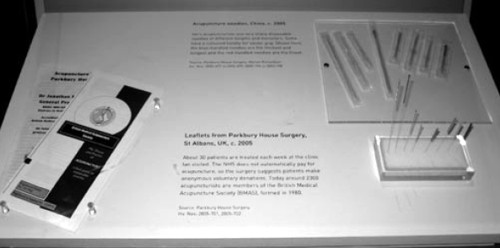
Traditional Chinese Medicine
There is plenty of this and it is totally uncritical. All it does is repeat the gobbledygook used by practitioners. In fact it was largely written by them.
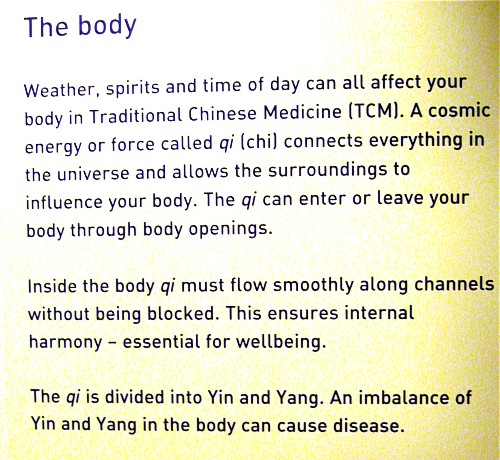
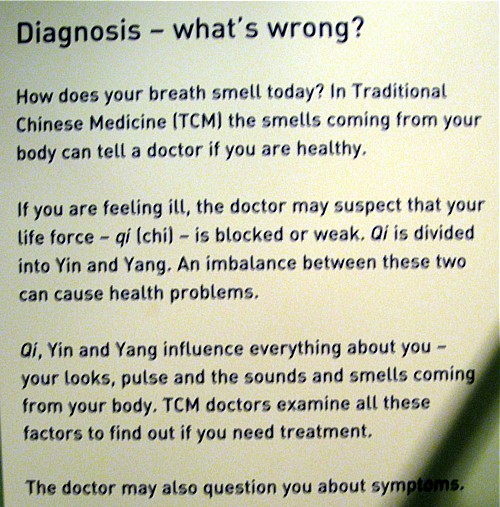
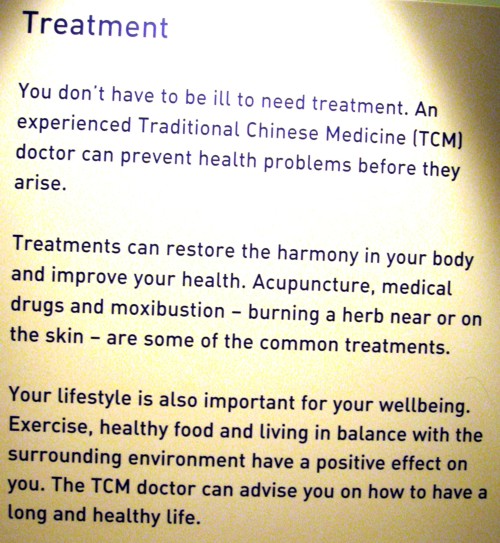
There are recorded commercials too. Listen to this one.
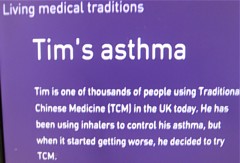
Advertising for cupping at the Asanté Clinic.
In the recording, Dr Ke diagnoses an asthma patient as having mucus in the lungs -by looking at his tongue (no kidding) -and recommends cupping. He says
“We need to clear this mucus, or the phlegm, in the chest by using cupping, It’s improving, sort of, the flow of the water, and flow out, in other words, suck out the badness from the body”
This, needless to say, is total rubbish.
The recording took place at the Asanté Clinic, on the Archway campus of the University of Middlesex. Ah yes, Middlesex. Take a look at ‘More quackedemia. Dangerous Chinese medicine taught at Middlesex University‘.
Unani medicine, Another advertisement for a private clinic.
|
|
|
Listen to a diagnosis being made by looking at the iris.
Iridology is, of course, total bunk Just one of the many phoney methods of diagnosis used by alternative practitioners, as an aid to selling you an expensive treatment.
Ayervedic medicine
Listen to another advertisement, for private Ayurveda clinic
The display that accompanies the recording is totally uninformative. The practitioners have been allowed to advertise their wares with no trace of critical thought. No trace of science.
|
|
|
|
|
|
|
|
|
The power of blogs
I guess this incident is yet another example of the power of blogs. My own letters to the science museum produced precisely nothing, as is usually the case if you go through the “proper channels”. Alex Davenport’s blog,on the other hand, stung the Science Museum into a public response. It’s true that the response is much the same as the patronising PR junk that was sent to me last year, though it was labelled as being by Susannah Shute, Web Content Coordinator. The response even linked to a picture of the homeopathy exhibit.
It seems a bit more pressure is needed to persuade the museum to change this particular exhibition into science, rather than its present anti-science.
Follow-up
13 April 2011. Simon Singh arranged a meeting with the new director of the Science Museum, Ian Blatchford, and deputy director Heather Mayfield Our deputation consisted of Simon Singh, Alex Davenport, Marianne Baker and me. It was Alex’s blog on the science museum exhibit, and my post on the museum which followed it shortly, that caused the meeting. Alex had a follow-up blog too. I hadn’t realised that Simon had resigned as a trustee of the museum five years ago, in protest about the (dreadful) alternative medicine exhibit. I had various stonewalling responses to my attempts to pursue the matter out of the limelight, so eventually went public. After the blogs appeared, the Science Museum published a response which was, sadly, entirely vacuous. We had an excellent discussion, during which Ian Blatchford said he regretted the official response and changes to the exhibit are promised. there is an account of the meeting here.
We were sent a revised version, which was improved, but not, we said improved enough.
10 May 2011. Got an email from the person who originally brought the problem to my attention.
“Visited Science museum yesterday , wonderful news – all offensive material gone, and different ok stuff there”.
Well done, Science Museum.

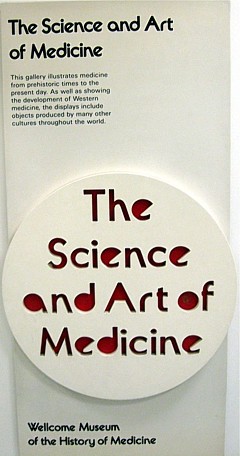 >
>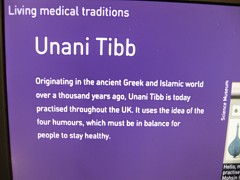
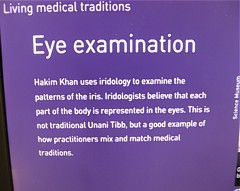
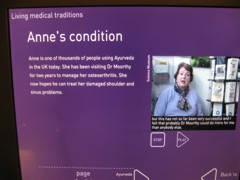
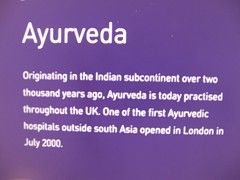
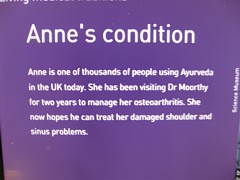
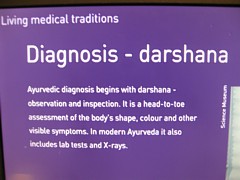
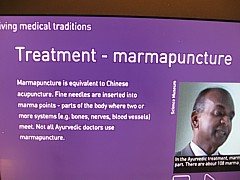
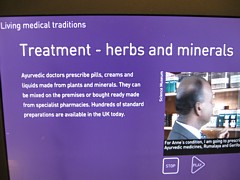

[…] This post was mentioned on Twitter by Thetis, Dave Clements, Stephen Serjeant and others. Stephen Serjeant said: RT @david_colquhoun: New post The Science museum promotes anti-science in a disgraceful exhibit http://bit.ly/h69E7W (see also http://b … […]
I also objected to Psychoanalysis being afforded exhibition space in the Science Museum and the reply I received from Professor Rapley suggested that the esteem given to the subject stemmed directly from its status at UCL. It was apparently curated by UCL’s Freud Professor of Psychoanalysis. (It must be difficult for the Science Museum to turn down an exhibition proposal by a bunch of alt med cranks when they’ve already given floor space to the psychobabble crowd a few months before). Therefore the average punter, seeing UCL and the Science Museum treating the subject as a legitimate, established science, is probably going to accept, without question, that it is. My prediction for the next Science Museum exhibition? Scientology and your inner Thetan.
Hmm, some people have difficulty with the word ‘alternate’. Where is the ‘anti-science’ here?
Why don’t we all just re-write history and pretend that alternative medicine doesn’t exist and is not valued by millions?
Better still – why don’t we just pretend that the Science Museum doesn’t exist?
And then move on to education – it’s far too dangerous to let people become informed on things and develop ideas of their own.
Let us all rant as loudly as we can in the hope we’ll be seen to be the voice of the calm majority, (instead of the paranoid self-delusionists who live in a self-created world of bigotry, fear and mistrust).
OF COURSE the science museum has this EXACTLY right. Even if you have no respect for alternative medicine and must call it ‘quackey’, museums are expected to give space to exhibits that display world customs and artifacts of relevant social history. If you can’t handle that don’t go there. Just stay in the narrow little field that you have chosen to confine yourself in.
You are the ‘unthinking crowd’ but thank goodness you don’t get to control everything.
@DebH
If you can’t see the anti-science, perhaps that is just because you don’t understand what science is and how it works?
Given the somewhat hysterical tone of your comment, I’m not sure you should be accusing anyone else of ranting.
Neither I, nor anyone I know, is proposing to make alternative medicine illegal. I do think, though, that there is a duty to tell the public when it is positively dangerous.
For example, do you personally believe that homeopathy can prevent or cure malaria? If you don’t believe that, then what are you doing to prevent people dying from that belief? I think you must answer that question id you wish to be taken seriously.
The Science Museum os meant to be about science (the clue is in the name), not about social or cultural history. It’s fine to include the history of science,of course, but in a way that is contrary to science.
This isn’t really a problem in the rest of the museum. There has never been much “alternative aeronautical engineering” because it is rather obvious when aircraft (or steam engines) don’t work.With medicine it is much harder to find out what work. I suppose that why people are easily fooled.
Your statement that “The Science Museum [i]s meant to be about science … not about social or cultural history” would seem to be where the heart of the problem lies. Science, now just as much as in the past, is part of society and culture and cannot be understood if divorced from this.
Even if you don’t think that this is what a science museum should include, the Science Museum does. Their statement about their collections and collecting policy includes the aim that they should “reflect the global impact of science, technology, medicine and media across all cultures”, past and present. To study or understand that impact properly they need also to consider instances where science is resisted, ignored or misunderstood.
http://www.sciencemuseum.org.uk/about_us/about_the_museum/collections/acquisitions.aspx
@DebH
“museums are expected to give space to exhibits that display world customs and artifacts of relevant social history”
It’s a fecking science museum. Get a grip.
@beckyfh
Certainly much of the interest lies in the history, for example the development of steam engines.
Perhaps the problem lies in the fact that much of the medicine in this exhibit comes from a time before biological science existed. It has no base in science at all.
You say
That’s exactly my point. I think it would be quite fair to say that all of the practitioners in the exhibit were people who “resisted, ignored or misunderstood” science, but the museum fails totally to point that out. It simply allowed them to advertise their wares.
@CrewsControl
What you say about psychoanalysis is quite disturbing. My problem is that it is just too big a topic, and too far removed from my interests, that I don’t feel able to take it on.
If somebody wanted to do a guest post on it, with quality comparable to the three recent posts on Steiner schools, I’d be happy to host it.
[…] the alt med exhibit ultimately caused him to quit the board of trustees. Professor David Colquhoun also made a complaint but to no avail. One would think that well-respected science communicators making such statements […]
Thanks for your response David. I haven’t had a chance to see the exhibit, so can’t comment fully but, from what I’ve seen so far, it is made clear that this section of the medicine galleries are dealing with ‘Living Traditions’ that are something clearly different to the ‘Modern Meidince’ dealt with elsewhere (despite being modern in the sense that they are currently practiced).
The exhibit also constantly introduces sections by saying so-and-so “believes” that such-and-such will help them, amd then allows the kind of patient or practitioner testimony you show above. I think that this treatment makes it quite clear that the Science Museum does not endorse these views.
Your comment that the science museum should not include anything that belongs to a period before what you understand as biology was developed is a bit bewildering. The nature of science and, especially, disciplines has been very fluid but this does not make the knowledge produced then uninteresting or irrelevant. There was no such thing as physics until the 19th century – does that put Newton out of the picture?
While the exhibit may not be perfect, in my view if, and only if, homeopathy and the rest were being presented uncritically within the main ‘Modern Medicine’ section would there be a need for a letter-writing and blog-posting. campaign.
@beckyfh
I said nothing of the sort! I was merely pointing out that if the history involves pre-scientific ideas that are now thought to be plain wrong, then the Science Museum should point out that that fact. It is much like giving space to the flat earth society, with no hint that they might be wrong.
That’s the important point, but there was another distasteful element to the display, the fact that people were allowed to advertise their private practices in pre-scientific medicine with the seal of approval of the Science Museum.
I sadly fear that you are giving me material for the talk I’ve been asked to give in the wake of the Sheldrake affair. The theme will be that philosophers (and occasionally historians) of science not only don’t help real science, but sometimes actually impede it.
Apologies if I misunderstood your comment. Again, I don’t feel qualified to comment further on this particular exhibit without having seen it but, leaving that aside, I can also see that we’re not going to agree on the value of anthropology, philosophy and history – to science and to culture more generally. I feel that the understanding brought by all of these fields can help us to make sense of the claims and place of science in society, and that this kind of knowledge can, therefore, only aid science communicators. I do not feel it is helpful for science to be presented as a finished, triumphant package of knowledge when it is not. Science and scientific advice are constantly changing, so people need to understand things like the processes that create science, where differences between science and other kinds of knowledge lie, and why scientists have sometimes got things drastically wrong, in order to make informed decisions. Simply being told what is (currently) right and wrong is not always the most helpful means of proceeding.
@beckyfh
Again it seems to me that you have the problem upside down. It is quacks who claim to have eternal truths, not scientists.
No of course not. I never met any scientist who does that, so it seems to be a straw man argument.
Absolutely. But how do you think that is advanced by a museum exhibit that allows people who practice pre-scientific ‘medicine’ sell their wares, unchallenged by any ideas that science may have?
I’m baffled, and slightly alarmed, by your defence of magic medicine.
I wondered how long it would be before you mentioned straw men! As you are perfectly aware, my comments above were generalised and not specific to this case and I am not defending “magic medicine”. I cannot believe that you are baffled.
I am glad to see that we actually agree on a lot!
@beckyfh
Forgive me, but your earlier comments, and especially those on Twitter (“I don’t consider this anti-science”), did seem very much like a defence of this particular exhibit.
And I did not mention straw men until you raised one.
No, I don’t consider that an anthropologically-framed exhibit showing things that really happen to be anti-science.
@beckyfh
So back to square one. It is a Science Museum, not an anthropology museum. And anyway, even anthropologists should not mislead people about what is true and what isn’t.
Beckyfh, the point, I think, is that it’s a Science Museum, not a history of medicine museum. If there is a lack of scientific scrutiny applied anywhere within the exhibit, that is surely farcical. Furthermore, if indeed there are real independent clinics and/or practitioners referenced, that’s simply shameful.
Indeed, back to square one. It is a museum *about* science: anthropology, philosophy, history, sociology etc. are all legitimate means of investigating science in society. The exhibit reveals things *that actually happen*, but makes clear that this is not mainstream scientific medicine. Again, I have not seen the exhibit to know if they fail to make this clear *enough*, or if the clinics are there simply as cited evidence or, really, as some kind of advertisement, but I think there is nothing wrong or anti-scientific with the principle.
@Corkyb It is a science museum *and* a history of science and medicine museum – just have a look at the collections. Try a search for alchemy, or anything else you can think of, at http://collectionsonline.nmsi.ac.uk/.
I’ll stop there. As I mentioned on Twitter I am planning a blog post on what science museums are/should/could be for at http://whewellsghost.wordpress.com/ – do come and check it out and leave your thoughts there in the next couple of days.
In my head the Science Museum should have some kind of examination of the science, or lack thereof, behind all of its exhibits.
Sorry to parrot David but you’ve made another straw man. Of course it is a “history of science and medicine” museum (you), but that’s quite a different way of putting it to “history of medicine” museum (me), which it ‘aint. If an institution presented itself as simply a Museum of Medicine there would be little issue.
Anyway, I’ll go check it out too (if only to get the number of a decent Angelic Reiki Master, I can’t find one for love or money), heh!
@beckyfh
I still have no real idea what you are saying.
Reflexology etc aren’t science at all, just babble. And it isn’t just history, they are presented as being practised here and now.
It really worries me that a serious science historian such as you seems to have so much difficulty in grasping the difference between recounting some of the bizarre pre-scientific ideas that abound in the history of medicine, and the present state of play of the science.
Could this be a result of the fact that you are more interested in physical sciences? They are very different. It is astonishing how recently medicine emerged from the dark ages. It is quite different in physics and the like. John Harrison’s chronometer number 4 was a serious and beautiful bit of work. But in 1759, when it was made, medicine was still deep in the dark ages.
The enlightenment in medicine is largely a 20th century phenomenon. But a visitor to this exhibition would never know it had happened. That is the problem.
[…] We posted this on the same day as David Colquhoun’s research and criticisms: http://www.dcscience.net/?p=4066 […]
@CorkyB Perhaps I should have clarified by saying it is a science museum (in your sense), a history of science museum *and* a history of medicine museum. Henry Wellcome’s collection is largely historic and anthropological and should be treated thus. (Incidentally, Wellcome said that his anthropological interests predated his medical interests: see http://www.wellcome.ac.uk/About-us/History/WTX052735.htm)
@David As you know full well, and as anyone who has read my comments will know, I am able to grasp the various distinctions you mention. So can the Science Museum, hence their division of the medical exhibitions into ‘Before Modern Medicine’, ‘Modern Medicine’ and ‘Living Traditions’.
Sorry – the link to the pages on Henry Wellcome as a Collector got garbled: http://www.wellcome.ac.uk/About-us/History/WTX052735.htm
“There has never been much “alternative aeronautical engineering”…”
http://www.sciencebasedmedicine.org/?p=34
[…] the alt med exhibit ultimately caused him to quit the board of trustees. Professor David Colquhoun also made a complaint but to no avail. One would think that well-respected science communicators making such statements […]
@Mojo
Thanks very much for reminding us of Mark Crislip’s wonderful article, Alternative Flight.
I hope that @beckyfh will read it and think about it.
You do know, don’t you, that I don’t believe that homeopathy has any efficacy beyond placebo, that I would never use it or recommend that anyone else use it? Nevertheless, people do (unlike your Alternative Aeronautics).
Well, I can see that the Science Museum may want to show unscientific medicine from a historic or even anthropology point of view, but then sentences like
“An experienced Traditional Chinese Medicine (TCM) doctor can prevent health problem before they arise”
is misleading. He cannot. He can be lucky, and it can happen that some of his methods align with actual, factual science, but as a whole, the sentence endorses TCM as such. And that’s just inappropriate for any Science Museum.
At the very least they could have plugged a “believe” somewhere in there, and explained that there is no evidence of “qi” even existing.
[…] so were a lot of other scientists and Skeptics! Some high profile skeptics such as Simon Singh and Prof. David Colquhoun were equally annoyed and had also expressed their concerns to the Science museum. Simon quit from […]
“it is made clear that this section of the medicine galleries are dealing with ‘Living Traditions’ that are something clearly different to the ‘Modern Meidince’ dealt with elsewhere (despite being modern in the sense that they are currently practiced). ”
Baloney. There is no difference in these 2 concepts for the lay person. In fact, simply the idea that some of these scam treatments are traditions that have been around for so long is commonly used to support their efficacy, so such simple labelling doesn’t provide any clarity at all, especially when the exhibits also make real health claims as Antares42 has provided an example of.
The problem isn’t the inclusion of woo in the museum, it’s the tacit endorsement of them. It doesn’t appear that any of them are presented skeptically or with any reference to what their efficacy standing is among the scientific community. It’s a crystal clear problem that I don’t understand why anyone would have trouble seeing.
If these exhibits were annotated with disclosures explaining how there is no evidence for them having any effect beyond placebo, there would be little to be pissed about, but instead they are presented as if they are viable alternatives to mainstream medicine.
[…] a figment of your imagination, received this reply from the Museum and was further stoked on DC’s Improbable Science, on Pharyngula and with a guest post on The Lay Scientist at the […]
I love the idea of alternative engineering!
This, and becky and deb’s comments, are what happens when you hand over a science museum to people with BA degrees. Presumably in sociology, judging by their relativist mutterings.
@David
I admire your Feynmanian patience. Someone (on another blog) kinda beat me to the punch but I’ll say it my way: I’m reminded of the creationists’ tactics for introducing religious dogma into science curricula here in the U.S. Shame on the Museum of Science for being an unwitting pawn in the game of Woo. Should it be too much to have an actual scientist check over an exhibit before it’s opened? Others may display a “what’s the harm?” attitude, but I remember the adage that one should be careful what one puts into a head, because it is virtually impossible to get it out. This, thanks to our “Intellectual Immune Systems,” A friend once posited that whether you are a Mac person or a PC person depended on how you lost your (computer) virginity. We’re wired to reject ideas that conflict with those we already have; therefore, the first idea into the head becomes established, and any subsequent notion which counters the first is dismissed initially. The portion of the general public that concerns me is the children–I shudder to think that the uncritical validation of anti-science be the first idea on the subject to enter the head of a child.
[…] and sociological perspective on medical practices”. The redoubtable David Colquhoun was also critical of the low level of the scientific content in the exhibition and Marianne and Alex re-visited the […]
[…] David Colquhoun already mentioned one of the most obvious free advertising elements; Parkbury House Surgery in St Albans probably gets a fair bit of custom out of this. […]
A final word from me. Please see this post for my account of this display. In my view the museum makes it quite clear that these traditions are ineffective medicine.
@beckyfh
Thanks. I have looked at your new post, and commented on it. I still find it sad that a historian of science seems to confuse interesting history with the current state of knowledge,
[…] a blog post hosted by their blogger Martin Robbins in reply to the Science Museum. At the same time David Colqhoun had also been musing on the same story and posted his thoughts as well, so we included his […]
[…] Alex and I wrote a reply on the Guardian website and David Colquhoun published his own material on the exhibit. I wrote one quick update and a longer one going over the […]